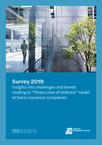Insights into challenges and trends relating to the “three lines of defence” model at Swiss insurance companies
The study examines how Swiss insurance companies implement the model in practice. The following aspects have been assessed:
- Benefits of the model
- Prerequisites and implementation status
- Task spectrum and scope of control functions
- Challenges of the implementation
- Current trends
For the study, 12 experts were questioned in personal interviews, and 35 insurance companies asked about the benefits of the Three Lines of Defence model, its implementation and their experiences to date by means of standardised, online questionnaires. The information gathered from the expert interviews and the standardised survey show that there is a high level of consensus on the basic benefit of the model, and reveal a homogenous view of current trends. The model makes an important contribution to promoting the importance and holistic implementation of risk management objectives. While there is widespread consensus regarding the rough outline of the three lines, when the results are broken down in terms of business segment and supervisory category, they reveal essential differences in their assessment of the challenges and in the operational implementation.
BENEFITS OF THE MODEL
The companies surveyed consider the greatest benefit of the Three Lines of Defence model to be clarifying the importance of the risk and control functions for the company and in holistic implementation of risk management
CHALLENGES
Over 77 % of the companies regard consistent understanding of materiality and risk and different assessment methods or fundamentals across different sectors / types of risk as the greatest challenge. Duplications, redundancies and how to reduce them are also a major issue. By contrast, reputation and authority of the control functions and (informal) delegation of responsibility to the control functions are perceived as the least significant challenges.
CURRENT TRENDS
From a sectoral perspective, enquiries about current trends relating to the further development of the Three Lines of Defence model reveal a homogenous picture. Reduction of complexity and increased focus on materiality were both judged to be important or very important. Implementation of measures to ensure independence, a concern of the supervisory board, was regarded as important.




